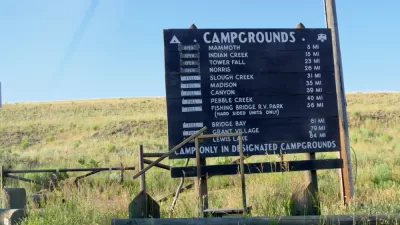The politics of the Department of the Interior under the Trump administration aren't likely to change, but new Secretary David Bernhardt is distinguishable from his predecessor thanks to a long history of oil industry lobbying.

"The Senate on Thursday afternoon voted to confirm David Bernhardt to lead the Department of the Interior," reports Umair Irfan.
"Bernhardt has been serving as acting secretary since January after Interior Secretary Ryan Zinke resigned late last year. He was nominated to be the permanent secretary in February."
According to Irfain, Secretary Bernharst's ascension follows a model set by the U.S. Environmental Protection Agency last year, Here's the pattern: after the previous secretary, a Washington outsider, resigned in controversy, the deputy, a former industry lobbyist and Washington insider, ascends to the top position.
In addition to identifying that trend, Irfain also lists three ket things to know about the new Secretary of the Interior: 1) Bernhardt has many potential conflicts of interest, 2) Bernhardt is likely to continue former Secretary Ryan Zinke's agenda of reduced federal land protections and environmental regulations, and 3) Democrats are likely to keep a very close eye on Bernhardt should the new Interior Secretary run afoul of the law or ethics rules.
FULL STORY: A brief guide to David Bernhardt, Ryan Zinke’s replacement at the Interior Department

Maui's Vacation Rental Debate Turns Ugly
Verbal attacks, misinformation campaigns and fistfights plague a high-stakes debate to convert thousands of vacation rentals into long-term housing.

Planetizen Federal Action Tracker
A weekly monitor of how Trump’s orders and actions are impacting planners and planning in America.

In Urban Planning, AI Prompting Could be the New Design Thinking
Creativity has long been key to great urban design. What if we see AI as our new creative partner?

King County Supportive Housing Program Offers Hope for Unhoused Residents
The county is taking a ‘Housing First’ approach that prioritizes getting people into housing, then offering wraparound supportive services.

Researchers Use AI to Get Clearer Picture of US Housing
Analysts are using artificial intelligence to supercharge their research by allowing them to comb through data faster. Though these AI tools can be error prone, they save time and housing researchers are optimistic about the future.

Making Shared Micromobility More Inclusive
Cities and shared mobility system operators can do more to include people with disabilities in planning and operations, per a new report.
Urban Design for Planners 1: Software Tools
This six-course series explores essential urban design concepts using open source software and equips planners with the tools they need to participate fully in the urban design process.
Planning for Universal Design
Learn the tools for implementing Universal Design in planning regulations.
planning NEXT
Appalachian Highlands Housing Partners
Mpact (founded as Rail~Volution)
City of Camden Redevelopment Agency
City of Astoria
City of Portland
City of Laramie





























